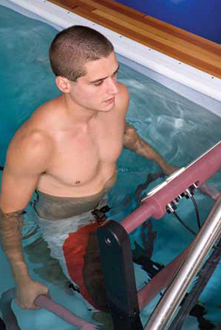Cover Story: Men’s Health: Promoting Physical and Emotional Wellbeing with MS
Written by Maryann B. Hunsberger
Edited by Susan Wells Courtney
Reviewed by Jack Burks, MD
Physical Issues for Men with MS
Separating MS from Non-MS Symptoms

Men with MS need to be especially proactive with their healthcare.
Stephen Z. of Norfolk, Massachusetts has MS and knows the value of good healthcare. He receives regular checkups to maintain his health, while seeing a neurologist every six months and scheduling MRIs as necessary. He also sees a primary care physician and various specialists for overall good health.
Stephen explains, “With any chronic disease, you tend to forget about other medical conditions. Overlooking symptoms is easy because you think they are part of the MS, even if they are not. These can be difficult to separate. Doctors do this as well as patients. It becomes more difficult to get other medical professionals to pay as much attention to you because you have a chronic disease.
“The MS specialists focus exclusively on MS, so you need other doctors to take your other symptoms seriously. This is more difficult to do when the other doctors pigeonhole you into the MS box and think every symptom is due to the MS. They tell you to talk to your neurologist, but then the neurologist says the symptom has nothing to do with the MS. You can fall between the cracks.”
MSAA’s Chief Medical Officer Jack Burks, MD, is also the director of program development at the Holy Name Hospital MS Comprehensive Care Center in Teaneck, New Jersey. Dr. Burks states that Stephen’s assessment of the situation is, unfortunately, accurate. “He’s absolutely correct. I hear this over and over again. The key is communication and coordination between the neurologist and the primary care doctor, but this coordination is usually fragmented.
“MS centers pride themselves on giving total care. They can address a greater number of issues, since they have nurse practitioners who are more in tune to the general health side of a patient’s care. But as a neurologist, I realize that most patients don’t have access to MS centers. For this reason, when a patient comes to me with symptoms that are not MS related, I write a note on a prescription pad stating what the issues are and saying that these issues are not related to MS. The patient carries this back to the family care doctor to have the issues taken care of. Patients need to be proactive in asking their neurologists to communicate with their primary care physicians and vice versa.”
Burks also agrees with Stephen on the importance of men getting good general medical care and routine physical checkups to look for non-MS related medical problems. “In certain cultures, ‘real men’ don’t need to see doctors unless they are almost dead. In fact, they consider it a sign of weakness to get medical care. On the contrary, a yearly medical checkup often reveals medical conditions that can be treated early. Men with MS need to be better listeners to their physical condition and realize that good general medical care, along with an approach using preventive medicine, will reduce problems in the future.”
Burks says that any medical conditions that can exist in men without MS can also exist in men with MS. “I tell my patients that one of my jobs is to make them the most knowledgeable manager of their own healthcare needs. Patients need to know which non-MS related tests are important. If a patient is on an interferon, such as Avonex, Betaseron, Extavia, or Rebif, a neurologist will order blood work. However, a neurologist won’t do a cholesterol check, because it’s not MS related. Patients might consider asking their neurologists to write on a prescription pad which routine tests need to be done and take the note to their family doctors.”
Possible Conditions, Recommended Screenings, and Regular Checkups
Earlier diagnosis of conditions not associated with MS allows for earlier treatment, quicker recovery, and potentially fewer complications. Men with MS should be carefully screened for the following non-MS related conditions:
- Diabetes
- Hypertension
- High cholesterol
- Cancer (colorectal, prostate, and testicular)
- Thyroid disorders
- Infections
- Anemia
- Orthopedic issues, such as knee, back and neck pain (from weakness, coordination problems, and overzealous exercising)
Regular checkups should also include:
- Appropriate immunizations against influenza
- Booster immunizations against childhood diseases and tetanus
- Pneumonia vaccines for those prone to this disease
- Electrocardiograms
- Chest x-rays
- Skin exams to check for abnormalities which may possibly develop into a cancer, such as irregular moles
As men with MS age, they may also need care for the following conditions, as they can be compounded by MS with aging:
- Erectile dysfunction
- Arthritis
- Prostate problems
Men with MS are also prone to developing health conditions that men without MS might not develop. Some of these conditions are:
- Osteoporosis from insufficient intake of vitamin D and calcium, certain drug treatments such as steroids, as well as reduced activity and exercise
- Pulmonary problems from poor posture or smoking
- Urinary tract infections due to neurogenic bladder and poor bladder function
- Injuries from falls due to lack of use of appropriate assistive devices or environmental adaptations
To prevent and monitor these conditions, men with MS should:
- Get bone density scans
- Take vitamin D and calcium supplements as recommended by one’s physician
- Increase activity and exercise if possible
- Assess pulmonary function and urinary tract health at their regular checkups
- Employ adequate safety measures, such as consulting a physical therapist for proper fitting and use of equipment, making home modifications, and seeing an occupational therapist if needed
Diet, Exercise, and Physical Therapy for Men with MS

Exercising in water, also referred to as hydrotherapy, is a good form of exercise for many individuals with MS.
Stephen has learned what most men his age have come to know – that it’s easy to gain weight when you hit 60, but not so easy to take it off. “I’ve never been very good at diets, but eating right has become more critical now. I can’t exercise much, so getting the weight off is more difficult. I’ve spent some time looking for programs with exercises that I can do.”
Unlike most men, Stephen has the extra challenge of MS to deal with. He recently began physical therapy at a newly opened medical center close to his home. He was excited to learn they had an exercise program for people with disabilities, and he started exercising there at the end of September. He enjoys the program and is happy to note, “They even have a treadmill in the pool!”
Men – with and without MS – are more prone to developing added weight in the abdominal area than women. These large abdomens can put added stress on the back and cause pain. Along with large abdomens comes visceral or intra-abdominal fat, which is fat that surrounds internal organs. Data suggest that visceral fat is associated with heart disease, stroke, diabetes, and hypertension.
Nurse Practitioner June Halper, MSN, APN-C, FAAN is the executive director of the Consortium of Multiple Sclerosis Centers and the International Organization of Multiple Sclerosis Nurses in Hackensack, New Jersey. She emphasizes that certain men are more likely to develop a larger abdomen due to family traits, so these individuals in particular need to be more vigilant about preventing weight gain.
Since diet is important to keep weight under control, Halper says that the United States Department of Agriculture (USDA) Food Pyramid is the best place to start when trying to maintain good health. “Their recommendations are consistent with a healthy lifestyle and weight control. Obviously, as a man might become more disabled and less active, fewer calories are required. It is also important to work with a personal healthcare professional for information about saturated fats and diet, as well as adequate amounts of protein. Getting plenty of fluids, preferably water, is important too.”
What about single men who are having problems with food preparation? Burks says that a consultation with a nutritionist can be helpful in learning about a nutritious diet. “The nutritionist can also recommend ‘quick fix’ meals that are healthy, instead of relying on instant meals or fast foods that are loaded with calories and salt.”

Following the USDA’s Food Pyramid guidelines can help to ensure a healthy diet, which includes an ample supply of fruits and vegetables.
When preparing meals isn’t possible, Halper offers that men with MS should try to find frozen dinners that are well balanced and contain low amounts of sodium and calories. She also stresses the importance of patient education. “Several websites offer valuable advice about nutrition. Additionally, many local hospitals and healthcare facilities provide community-based education about nutrition and wellness. A wellness mentality, along with wellness activities, will help patients sustain a good quality of life despite the problems imposed by MS.”
Since exercise is a valuable component for maintaining strength, flexibility, balance, and weight, Burks recommends a physical therapy evaluation and home program, if possible. “People with disabilities, including those who use a wheelchair, can usually exercise regularly under proper supervision. The key is to exercise without becoming exhausted. The point of exhaustion is often different for each patient, so this requires guidance from a physical therapist. MS exercise programs frequently start with less-rigorous exercises which are increased as indicated. Starting an exercise program with a strenuous regimen may lead to increased symptoms and discourage people from continuing.”
Halper stresses the importance of physical therapy if there is an MS relapse, worsening of function, or disease progression. “Based on insurance coverage, physical therapy is usually time-limited, with set goals such as improving function, safety, reducing spasticity, and addressing pain. Continuing physical therapy strategies is important, even after the person is discharged, in order to maintain the goals achieved.”
She also states that adapting exercise to meet physical needs is crucial. “Men who become more disabled may have to change their exercise routine. A runner may become a swimmer; an outdoor biker may use an indoor stationary bike. Even men in wheelchairs should exercise their upper bodies with light weights, stretching, and Therabands for resistance routines. Exercises such as yoga, tai chi, and Pilates, can be adapted to provide movement and exercise even for the more disabled man. Activities such as swimming in a cool pool (no warmer than 82 degrees), horseback riding, walking, and stretching are all important in MS, but the choice is up to the individual, based on personal preference.”
LIFESTYLE FACTORS
Dr. Jack Burks and Nurse Practitioner June Halper emphasize that men with MS need to be vigilant about lifestyle factors that can help or hinder their health.

The following lifestyle factors can influence health negatively:
- Smoking
- Drinking
- Taking illegal or unprescribed drugs
- Poor diet
- Poor stress management
- Poor sleeping habits
- A sedentary lifestyle
The following lifestyle factors can influence health positively:
- Avoidance of smoking, drinking, and illegal or unprescribed drugs
- A low-fat, heart-healthy diet
- Relaxation techniques
- Good sleeping habits
- Supervised exercise
- Regular medical checkups
- Reaching out to family, friends, and others with MS to share experiences and ideas
- Exploring disease-modifying therapies for MS, beginning very early in the disease course if possible
- Seeking help for depression and anxiety
- Finding ways to maintain a sense of self-esteem
Halper says that men who are minimally disabled from MS should continue exercising as they did prior to their disability, although they need to avoid overheating since symptoms could worsen with heat. Some men with MS join a health club and work with a personal trainer to modify their routines. Halper notes that exercise schedules for minimally disabled men should remain consistent, although she cautions that their schedules may need to be modified in light of fatigue later in the day.
Resources for Physical Health
WebMD Men’s Health
Mayo Clinic, Men’s Health
National Institutes of Health, Men’s Health: (301) 496-4000
Centers for Disease Control and Prevention, Men’s Health: 800-311-3435
United States Department of Agriculture (USDA) Food Pyramid: (888) 779-7264
Men’s Health Network: (202) 543-6461
Emotional Issues for Men with MS
Depression, Identity, and Adjustment
Men with MS face the same emotional issues as most people with a chronic disability. Still, an MS diagnosis can be daunting. Adam Kaplin, MD, PhD, holds several positions at the Johns Hopkins University School of Medicine, including chief psychiatric consultant to the Multiple Sclerosis and Transverse Myelitis Centers; and assistant professor in the Departments of Psychiatry and Neurology. Kaplin says that the unpredictable nature of MS can cause problems. He explains, “Ten percent of the time, MS is a benign condition that doesn’t cause any significant disability. For others, it is an unrelenting progressive illness. The unknown is tough to deal with. Clinical depression with MS can come both from adjusting to life under altered circumstances, and from inflammation in the brain. It’s a clinical syndrome that has been correlated with a worsening case of MS, since people who are depressed have a more aggressive immune system.”
According to Kaplin, although MS is roughly three-times more common in women than men, clinical depression is found equally in both genders with MS. “This differs from the general population, where women are twice as likely to have depression. However, men are more likely to view depression as a source of shame and are less likely to seek assistance.”
Some men find that adjusting to life under altered circumstances to be overwhelming, especially when a man’s disability is severe enough to change his lifestyle. David Rintell, Ed.D., is a psychologist at Partners MS Center, Brigham and Women’s and Massachusetts General Hospital and clinical instructor of psychiatry, Harvard Medical School. Rintell notes that this difficulty with adjustment can cause problems. “Men are brought up to be protectors, doers, wage earners, and people who maintain control of their situations. This is how male identity is formed, and it makes MS difficult, because MS may interfere with one’s ability to earn money and protect his family.”
 Rintell can relate to the fact that many men are oriented around fixing things, and he explains that problems can occur because men can’t fix MS. “Because of our orientation as doers, men sometimes experience a loss of self-worth and develop frustration, anger, and depression when we can’t do things,” says Rintell. “There is more difficulty in maintaining our identity. We aren’t usually comfortable talking about our emotions, so men often keep their personal struggles inside. This makes men more vulnerable to getting derailed by the problems facing them with MS.”
Rintell can relate to the fact that many men are oriented around fixing things, and he explains that problems can occur because men can’t fix MS. “Because of our orientation as doers, men sometimes experience a loss of self-worth and develop frustration, anger, and depression when we can’t do things,” says Rintell. “There is more difficulty in maintaining our identity. We aren’t usually comfortable talking about our emotions, so men often keep their personal struggles inside. This makes men more vulnerable to getting derailed by the problems facing them with MS.”
Men may need to redefine their roles in the family to facilitate a smooth adjustment. However, most men struggle to keep things the same. “This is where people end up with trouble,” says Rintell. “My father had MS. He was the family driver who drove anywhere we went. After many years, my mother had to take over. It was a blow because that role was important to him to be captain of the ship, so to speak.”
When a man is so attached to a particular function, it’s difficult to replace that and regain his feeling of value in the family. Rintell explains, “If a man feels like he is less of a person, he may feel that he doesn’t have as much to offer to his family. He may disconnect or take less of a role, even if he isn’t physically disabled from other roles. He can become disabled psychologically.”

MS can sometimes challenge a man’s identity as the provider and protector of his family. Adapting to changing roles and learning new strategies are key to good emotional health.
One becomes disabled psychologically when one doesn’t adjust to change. “Fathers may feel that if they can’t do one thing, they can’t be a good parent, so they withdraw from the other really important activities. This disables them emotionally,” says Rintell.
Kaplin is familiar with this scenario, but says it can be resolved. One patient sadly said his days of coaching his girls’ softball team were over because his need for a cane prevented him from sliding or running the bases. Kaplin suggested that he find other ways to help the team. The patient found an assistant coach to do the physical work while he verbally coached the girls from the sidelines. “Sometimes, people become so committed to a failed solution that they can’t see they need to step back and find a different solution. This man found that just showing up to each game with a cane was teaching the girls not to give up – and this must have worked, because his team won! It was a life lesson far above anything about fielding a ball.”
According to Kaplin, the key to adjusting successfully is constantly adapting and learning new strategies. “Just as having children causes you to reprioritize and to constantly readjust and learn new strategies at each stage of a child’s development, with MS, you have to constantly adapt and learn new approaches.”
Adapting to Life with a Disability
Greg W. from Westford, Massachusetts knows about the importance of adapting to learn new approaches. After his progressive MS symptoms hindered his ability to kneel in his large garden to care for his plants, he began researching various ways of gardening. “I made up my mind that I was going to figure out a way to keep my hobby going without letting my MS get in my way. I researched gardening for disabled people online and learned about container gardening. I called schools and asked if their custodians had any five-gallon containers they didn’t need. To my surprise, I got one hundred! I started the containers with soil and seeds in my basement. I put the containers under grow lights and then would transfer them to my yard.”
When Greg’s disability progressed to the point that he couldn’t access the basement any longer, he began buying small plants and transplanting them in the containers in his yard. He created paths between containers of Brussels sprouts, squash, broccoli, tomatoes, eggplant, and green beans so he could use his power scooter to water and weed his plants. He pays a student to mow the lawn and move the heavy containers. “Nothing is impossible if you really want to do it badly enough. You have to study a lot to figure out new ways to do things. I’m going to write about my gardening for my church’s website to share with other people how to do container gardening.”
Greg’s willingness to change was crucial to successfully living with a disability. Rintell says this is the key for helping anyone with MS to adjust. “Try something new. Look back at the things you used to enjoy doing that you didn’t have time to do, or gave up doing, because you were too busy. Tackle those. You can also find a way to do something about MS, such as volunteering your time to an MS organization or facilitating a peer support group. Educate yourself. Be a support person for one of the fundraising events. It’s not so much what you do, but that you do something.”

Discovering new activities and learning ways to adapt them for your specific needs can make life more enjoyable.
Since many men excessively focus on work, they often have difficulty adjusting to leaving the workforce. Rintell stresses, however, that many men make this transition successfully with the help of a support group. “This is more difficult for men with MS than men who retire, because their peers are still working. That’s why support groups for men are so important. I formed such a group after meeting a number of men with MS who needed to reformulate their goals and figure out what to do nextension Men are more likely to open up emotionally with other men than in mixed groups.”
Rintell says that many of these men have capably evolved to becoming the primary parent and maintaining the household. “A successful transition often involves changing a man’s focus to his family, connecting with friends, setting new achievable goals and working on them. It’s important to work on doing something about MS, whether it be volunteering, fundraising or participating in a clinical trial. A man can have goals and work to achieve them.”
One of the most important sources of self-esteem is having a feeling of accomplishment. Making progress toward goals is crucial to this. Rintell says, “Sometimes, people can’t achieve their previous goals, and they are not replaced by achievable goals, which causes self-esteem problems. To be successful, goals must be achievable and the progress can be gradual. If the goal is to clean out the attic, it needn’t be done in one day. For instance, if the attic is full of boxes and you are overwhelmed by the work involved, you may feel as though you can’t do anything about it. But if you open one box per week and look through it, you will make progress toward your goal. Eventually your attic will be box-free.”
Kaplin says that many men successfully transition to a new lifestyle by using a team method. “You are now the CEO of a condition that requires a team approach. Men traditionally deal with things on their own, but that doesn’t work with MS. They must learn to be the head of a team and request help from their ’employees.’ They need a team of clinicians, friends, and family members. They must be willing to ask for help to adjust to all the things MS will throw at them.”

Men may feel more comfortable talking with other men – rather than women – about their feelings and concerns.
Greg says his friends and family members are more than willing to be part of his team. Because he doesn’t feel sorry for himself, his friends don’t feel uncomfortable around him. “I have found that my friends love to help me. It’s difficult to visit other people, but my friends carry me and my wheelchair into their houses. One friend even built a ramp onto his home so I could spend time at his house.”
The most important member of Greg’s team is his wife, Nancy. “She’s so strong and so special. She’s the love of my life. She laughs all the time. I think the secret to dealing with MS is my wife. She showed me how to not ever feel bad about needing help. Our relationship has gotten stronger through my having MS. Everyone says I’m lucky to have Nancy because they don’t know if another woman could handle everything.”
Stephen also says that his wife, Sarah, is his strongest supporter. To keep the romance alive, they share a passion for visiting museums and historic sites, and they take advantage of weekend getaway trips to accessible locales.
Kaplin says that despite his 27 years of schooling, the vast amount of his education has come from his patients. “I have learned 70 percent of what I know about MS from patients, not from all my years of school. Working with patients who are confronted by life under altered circumstances shows me what’s really important.
“Life isn’t about having the fastest car or the biggest house. It’s about caring about others and letting them care about you. I wouldn’t want to live in a society that didn’t have room for people who have learned from adversity and come through the other side. Living with MS isn’t about life being over. It’s about learning how we as people can always adapt and never give up.”
Resources for Emotional Health
SAMHSA’s National Mental Health Information Center: (877) 726-4727
WebMD Mental Health
MedicineNet.com emotional health
Helpguide
Men’s Health Consulting – publications: (800) 935-5636
National Institute of Mental Health: (301) 496-4000
The Special Challenges of a Male Care Partner to Someone with MS
According to the National Family Caregivers Association (NFCA), more than 22.4 million United States’ household members are family caregivers. A 1997 survey conducted by AARP and the National Alliance for Caregiving found that 27 percent of caregivers were men. By 2004, the percentage of male caregivers had risen to 40 percent. Because more women have MS than men, the percentage of male caregivers may be even higher in households with MS.
 Sixty percent of male caregivers work full time. According to the National Alliance for Caregiving, it’s common for these men to routinely awaken in the middle of the night to help their wives use the bathroom. They may also arrange their days off around their partners’ medical appointments. Rintell says this creates a difficult situation. “Many men work all day, keeping telephone contact with their partner and then going home and providing personal care.”
Sixty percent of male caregivers work full time. According to the National Alliance for Caregiving, it’s common for these men to routinely awaken in the middle of the night to help their wives use the bathroom. They may also arrange their days off around their partners’ medical appointments. Rintell says this creates a difficult situation. “Many men work all day, keeping telephone contact with their partner and then going home and providing personal care.”
Finding good home healthcare to supplement a man’s work as a care partner is difficult, since caregiving families have median incomes that are more than 15-percent lower than non-caregiving families. Rintell says, “There is less assistance available for people who have an income, making it harder to hire an aide. In Massachusetts, which is progressive in terms of healthcare, only people on Medicaid are currently eligible for home healthcare.”
NFCA states that in 2000, the typical working family caregiver lost $109 per day in wages and health benefits because of providing care at home. Additionally, many families lose income when a disabled family member must give up working. Bob J. of Cape Cod, Massachusetts, can relate. “The fact that my wife had to stop working just as she was entering her prime professional years has made a big difference. These are the years when we expected to be the most comfortable financially. We’ve adapted by living a modest life.”
Sixty-two percent of care partners have had to alter their working situation, ranging from arriving late at work to giving up work entirely, according to NFCA. Bob says, “Because my wife has MS, it means that I can’t travel for work anymore. My wife’s wellbeing is always on my mind when I’m not at home. It’s very limiting.”
Family caregivers who provide care 36 or more hours weekly are more likely than non-caregivers to experience symptoms of depression or anxiety. NFCA says the rate is six times higher for spouses. Bob states, “My wife’s MS is the defining factor in both of our lives. Our friends are going on with full, active lives, but we’re stuck at home most of the time. I can’t do most of the fun things that my non-caregiver friends do regularly and take for granted. This makes me feel extremely isolated. I’ve had to either cut back or completely give up my independent recreational activities, because my wife is dependent on me for everything. And I would feel guilty if I were out having fun while she’s at home alone. She doesn’t do anything without me.”
Male care partners may have more difficulty adjusting to their roles because they are less communicative than female care partners. Kaplin points out that this makes it harder for men to ask for help. “Men don’t have the same fluency at communicating their needs with others as women do.

Men who are care partners may need to learn new tasks, although they may also find that doing such work can be very satisfying.
As caregivers, men don’t do as well at explaining what support they need. Men commonly confide in their wives, but now they don’t want to burden their wife with sharing that their newfound responsibilities are difficult. They have no outlet. This is something they need to work on. The men I know who get together and confide in others tend to do better in this area. A group of guys can get together and play poker, talking while they play. It is so important to talk to someone else who is going through this.”
Rintell says that despite lapses in male communication, many men eventually excel at caring and nurturing. “Some men are frustrated because they are new to some of the tasks that ‘Mom’ used to do. They need to learn a lot of new things. However, most men are up to that challenge and find that what used to be Mom’s work is pretty satisfying to them.”
In some cases, a cognitive impairment may impact a patient’s ability to make decisions, leaving the full responsibility on the patient’s partner. Bob explains, “I always did a lot around the house, so that has not changed. However, I need to make parental decisions alone due to my wife’s MS-related cognitive impairment. I miss being able to talk things over and arrive at decisions together.”
Bob stresses that male caregivers and their partners should take part in fun activities as often as possible. “We try to be positive, have a good sense of humor, and do what works. Not dwelling on the MS-imposed restrictions works best for us as a couple. We make sure to go out together once or twice a week, even if the destination isn’t particularly exciting or varied.”
Rintell recommends that couples also create a special space for romance. “A lot of people’s bedrooms become outposts of the local pharmacy with pill bottles and catheters around. That’s not romantic or sexy. Get away from the medical stuff. Have a romantic rendezvous in a special spot in your own home at a time of day when your partner has more energy.”
Bob suggests accepting help offered by others as a way to reduce stress. He also recommends being realistic about limitations. “I avoid reading or exposing my wife to articles about people with MS who do exceptional things. Such articles are well intended, but in my opinion, they make the more typical MS sufferer feel badly because they can’t do those exceptional things. And such articles misinform those who don’t know about MS, leading them to think that ‘if she would only try harder, she could do those things too.’ It is very aggravating listening to comments like that.”
Despite the difficulties, Bob says his wife’s MS has strengthened their marriage. “I think coming to terms with the limitations imposed on us by my wife’s MS has made us both more serene and accepting. We no longer have petty arguments. In many ways, our relationship has improved.”
 Burks was asked to comment about people with MS doing exceptional things. He remarked that while most MS patients probably won’t bicycle across the country, people need to rethink what exceptional means.
Burks was asked to comment about people with MS doing exceptional things. He remarked that while most MS patients probably won’t bicycle across the country, people need to rethink what exceptional means.
Burks explains, “Our MS patients are the most exceptional people that I’ve ever met, and they do things all the time that they might not consider exceptional. However, making the adjustment to remain productive in one’s life when faced with these challenges is exceptional. Productivity doesn’t mean making a certain dollar amount each year. People with MS can be productive by maintaining good relationships, participating in the loving care of children, and teaching their children to become the best people possible.
“People with MS can be productive by writing letters to newspaper editors or elected officials about issues people with disabilities face. They may also help at church or volunteer for an MS organization. The creative ways most people with MS manage their disease and their lives to make the world a better place is inspirational to me.”
Care Partner Resources
National Alliance for Caregiving
National Family Caregivers Association: (800) 896-3650
The Caregiver Community Action Network
Well Spouse Association: (800) 838-0879
